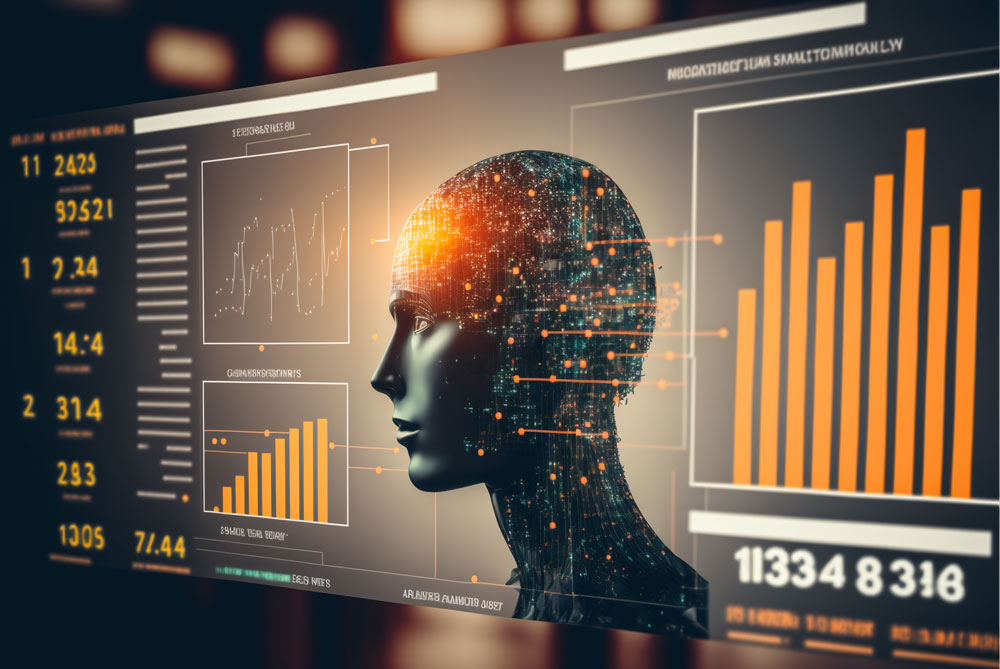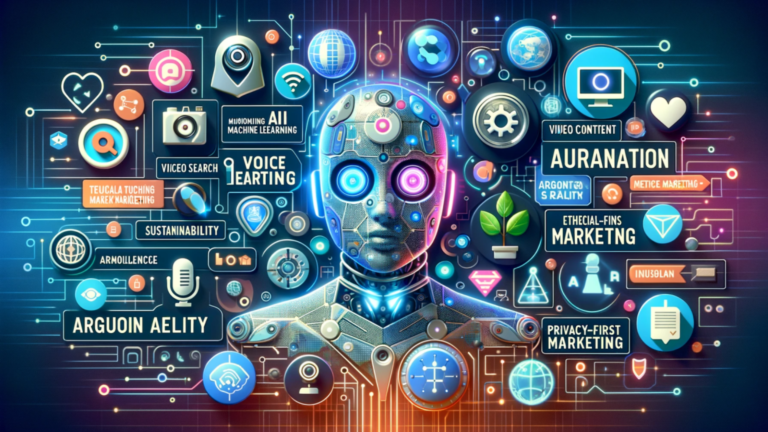Artificial Intelligence (AI) has become a buzzword over recent years and has had significant effects on various industries – not least digital marketing. AI holds immense promise to revolutionize how digital marketers approach their work; yet some fear its increased use may result in job losses or an erosion of personalization.
Is AI a Friend or Foe to Digital Marketers? Exploring the Pros and Cons Share on X
AI has already revolutionized digital marketing. It can analyze vast amounts of data and offer insight to help digital marketers make smarter decisions, as well as automating tasks such as ad targeting, content production and email marketing. Some experts fear AI could take over certain tasks that require humans – leading to job losses and creative block. So the question arises whether AI is truly friend or foe?
Understanding AI in Digital Marketing

Artificial Intelligence (AI) is rapidly altering the digital marketing landscape, so it is crucial that marketers comprehend its role. AI uses machines to perform tasks typically performed by humans like learning, reasoning and decision-making – in digital marketing terms these tasks may include data analysis, automating processes and personalizing experiences for customers.
One of the key advantages of AI in digital marketing is its rapid ability to analyze massive amounts of data quickly. AI algorithms can identify patterns and insights humans may miss, providing marketers with critical data-driven information they can use for decision making, optimizing campaigns and increasing ROI.
AI can also help automate processes such as email marketing, social media scheduling and ad placement – saving both time and resources while freeing marketers to focus on more strategic tasks. AI chatbots provide customer service 24/7/365 enhancing customer experiences while decreasing response times.
AI in digital marketing also brings with it another key advantage – personalization. By analyzing customer data, AI algorithms can use personalized experiences for each individual customer by using targeted ads, emails or product recommendations – increasing engagement while improving customer loyalty and driving sales.
AI offers many benefits, but it should never be treated as a panacea. AI algorithms only perform as well as the data fed into them; errors may arise. Therefore, it’s crucial that these AI-powered programs be regularly checked to ensure accurate results are produced by them and utilized to augment human decision-making rather than replace it altogether.
AI can be an extremely helpful asset to digital marketers. It can analyze data, automate processes, and customize customer experiences – but it should never replace human intelligence; AI must instead help digital marketers improve decision making processes while increasing accuracy.
AI as a Friend to Digital Marketers
Artificial Intelligence (AI) has long been a hot topic in digital marketing circles. While some may see AI as an obstacle, the truth is that it can be an invaluable asset to digital marketers. Here are a few ways AI could be an ally:
Artificial Intelligence’s major advantage lies in its capacity to automate repetitive tasks, saving marketers time and energy. Chatbots powered by AI are one way in which AI helps marketers save time. AI also automates email campaigns, social media posts, and ad targeting, giving marketers more personalized and effective campaigns.
Personalization and Customer Engagement
AI can assist digital marketers in tailoring their campaigns to each customer’s preferences and behavior, through analysis of customer data. AI can recommend products, services, or content likely to appeal to each individual based on these findings; additionally it can create more engaging videos as well as provide real-time responses for inquiries that arise from customers.
Data Analysis and Insights
Artificial Intelligence can quickly and accurately sift through large volumes of data to gain useful insights that can inform digital marketing strategies. By studying customer behavior patterns and trends, AI can uncover patterns and trends marketers can use to enhance their campaigns and make data-driven decisions. AI also helps track campaign performance while monitoring areas for improvement as well as make data-driven decisions for decision making purposes.
Conclusion Artificial Intelligence can be an ally to digital marketers by increasing efficiency and automation, personalization and customer engagement, data analysis and insights. With AI technologies continuing to evolve rapidly, digital marketers must stay abreast and use its benefits for more successful campaigns.
AI as an Enemy to Digital Marketers
Job Displacement
One of the primary concerns surrounding AI technology in digital marketing is job displacement. As AI becomes more advanced, it can perform tasks once completed by humans such as data analysis, content creation and customer service – such as performing this role efficiently but at a reduced cost to businesses and thus potentially leading to job losses for marketers. While AI may increase efficiency and productivity levels significantly; its introduction may result in job loss for marketers.
Lack of Human Touch
AI poses another drawback to digital marketing – its lack of human contact. AI may be capable of processing data and making decisions based on it, but it cannot replicate the human touch that’s essential in building relationships with customers and making them feel heard and understood; AI cannot replicate this level of personalization for customer interactions.
Data Privacy Concerns
AI technology also poses serious concerns for data privacy. As it becomes more advanced, AI programs may collect and analyze large volumes of customer data that could be used for targeted marketing campaigns as well as more sinister means; marketers must therefore take precautions to protect customer privacy and ensure their customer information is not being used improperly.
Conclusion While AI may bring many advantages to digital marketing, it also raises legitimate concerns such as job displacement, human touch deficiency and data privacy issues. Marketers must remain mindful of these considerations when integrating AI into their strategies.
Balance of Pros and Cons
When considering AI’s impact on digital marketing, it is crucial to weigh its advantages and disadvantages carefully. AI holds immense promise but also presents major obstacles. On the upside, however, AI could enable digital marketers to:
Analyzing large amounts of data quickly and accurately; creating personalized marketing messages tailored to specific consumers; automating routine tasks to free up more time for creative work; automating routine tasks so more creative work may take place; targeting and segmentation audiences for improved success – these capabilities help your organization excel.
Improve customer experience through chatbots and interactive tools; however, AI also presents potential drawbacks for digital marketing. For instance, AI may raise ethical concerns around data protection and privacy protection whilst increasing bias risk when making decisions and decreasing human input and creativity.
Limit the ability to develop authentic relationships with customers
Overall, AI offers digital marketers both advantages and drawbacks. To maximize its use responsibly and ethically. To make sure AI fulfills its potential.
Future of AI in Digital Marketing
With AI technology advancing at an astonishing rate, its influence in digital marketing should grow substantially over time. Artificial Intelligence promises to revolutionize how digital marketers approach their work with potential improvements to efficiency, accuracy and overall effectiveness.
AI technology could have an enormous effect on customer experience. By analyzing vast amounts of data, AI algorithms can assist marketers in understanding customer behavior and preferences more precisely, enabling them to customize campaigns to specific target groups – leading to more individualized and engaging interactions that could ultimately drive sales revenue growth.
AI could play an essential role in content creation. By analyzing data and providing insights, AI algorithms can assist marketers in identifying which types of posts resonate best with their target audiences and guide the production of more engaging, impactful pieces resulting in higher engagement rates and enhanced results.
AI holds great promise for digital marketing. While this technology does pose some risks and drawbacks, its potential benefits are considerable. By harnessing it to enhance customer experiences, optimize content production processes, and streamline workflow processes digital marketers can stay ahead of competition and drive success for years to come.
Recommended Read:
MUST-HAVE ONLINE TOOLS FOR DIGITAL MARKETERS IN 2023
HOW AND WHERE TO LEARN SEO IN 2023?
TOP 5 WAYS TO IMPROVE LOCAL SEO RANKING IN 2023
General FAQs
AI algorithms can identify patterns in user data and predict which users will engage with specific ads.
Understanding your audience better: AI helps you analyse large amounts of data and predict every customer’s buying behaviour/decisions.
It uses advanced algorithms to analyze data, identify target audiences, and suggest tailored marketing strategies.




